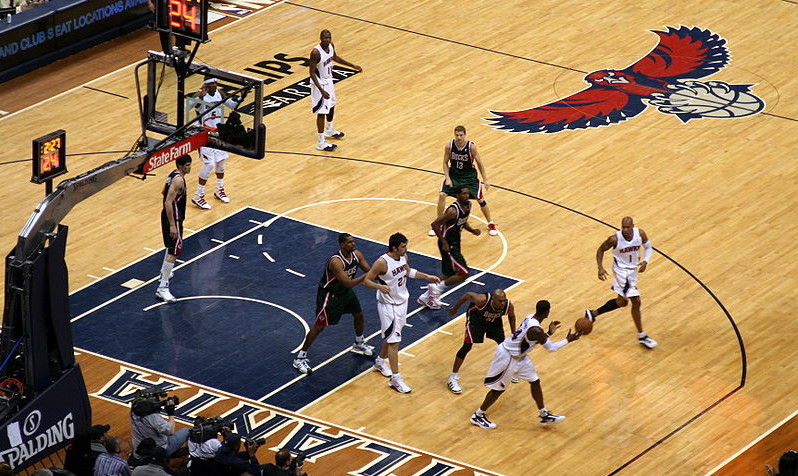A new piece of wreckage recently floated onto the NBA’s shore, riding the waves of racism that emerged from the Donald Sterling debacle. This rotted driftwood comes from the sinking ship of the Atlanta Hawks: Bruce Levenson, the majority stakeholder of the Atlanta basketball team, and Danny Ferry, the Hawks General Manager, were both found responsible for racist comments made over the past few years. Levenson recently reported himself to the NBA for sending a racist, stereotyping email back in August 2012, and announced his plans to sell his stake in the team on September 7, 2014. Ferry has announced his indefinite leave of absence after making racially insensitive remarks about All-Star forward Luol Deng in a private meeting that was secretly recorded by Michael Gearon Jr., the other primary owner of the Hawks. These heinous remarks have engendered major backlash, but they are fading into the larger saga of the Atlanta Hawks management – and they should not be allowed to do so. Ferry, arguably, is being sufficiently punished and shamed by the Hawks, NBA, and general populace; this is his first, and hopefully last, transgression of this manner. Levenson, however, is making off like a bandit. Self-reporting his own email and then planning to sell the team for a large gain in the wake of a self-created ignominy is bad enough, but using racism to create more publicity and an ultimately larger selling price is morally abhorrent. Drumming up a feigned scandal to capitalize on humanity’s disgust for racism cannot be allowed to merely capstone the failure of Hawks management.
When Bruce Levenson, Michael Gearon Jr., and Steve Belkin bought the Hawks in late 2003, hope was high for a revival of the franchise. Instead, infighting and gross power plays slayed the Hawks ownership and left more than a blemish on the Hawks history. The tale truly began in 2005 when Belkin disagreed with Levenson and Gearon, who thought that the Hawks should sacrifice $70 million to acquire the highly praised free agent, Joe Johnson. This disagreement exploded into a five-year legal dispute that ended with Levenson and Gearon muscling Belkin out by buying out his 30% share of the team. A year later, the owners sold their control of the Atlanta Thrashers, Atlanta’s past NHL team, which subsequently became the Winnipeg Jets. Only three months later, the ownership agreed to sell the Hawks to Alex Meruelo, a successful fast food pizza chain owner, but the deal eventually fell through due to the NBA’s doubts regarding Meruelo’s financial situation. Following the failed sale, Levenson publicly declared his excitement to continue on as owner of the Atlanta Hawks. Fast-forwarding to June 2014, the Hawks hired an Atlanta law firm, Alston and Bird, to investigate “the organization’s handling of race-related issues” after Ferry made his Luol Deng comments – again, secretly recorded by Gearon, who has famously clashed with Ferry since Levenson hired him. During this investigation, Levenson’s email was uncovered, prompting Levenson to voluntarily report himself to the league. Levenson, sparing new Commissioner Adam Silver from having to make a tough decision, released a statement and announced his plans to sell the team before the closure of the league’s own investigation of the email. Levenson has since been praised for his cooperation with the league and for turning himself in willingly.
But why did Levenson report himself in the first place – was he afraid Gearon would seize the opportunity to oust him, like Gearon tried to accomplish with Ferry? Levenson clearly wanted out of this franchise, as he tried to sell the team back in 2011. A racist email, albeit horrible, would have probably only resulted in a fine or suspension. It is plausible that Levenson was not genuinely biting the bullet, and doing an honorable deed by turning himself in to the league. It is, in fact, more likely that he made a calculated business decision. He “sacrificed” himself for the integrity of the Hawks and the sport in order to make an exorbitant amount of money. The Hawks were originally sold to Levenson, Gearon, and Belkin for about $208 million, but could now be sold, if the sale of the Clippers is any indication, for nearly $1.5 billion. Levenson saw the $2 billion sale of the Clippers and seized the opportunity to jump ship – not by walking the plank, but by floating off in a gilded rowboat.
If Levenson had just tried to sell the Hawks outright, he still would have commanded a hefty sum of money. Instead, seeing the pecuniary success of Donald Sterling, Levenson drummed up a racial scandal in order to inflate the eventual selling price. Now, with all the media coverage, more potential buyers will come scrambling to the dying Hawks franchise, hoping to upright the ship and raise a sail of morality and stability. This odious scheming should not be a final chapter in the tattered book of the Atlanta Hawks ownership history. Levenson’s prevarications and plan to profit on society’s hatred of racism transcend petty disagreements like power struggles, secret recordings, and treachery. If this nation ever wishes to recover from its long history of racism, people like Levenson cannot be lauded for a veneer of contrition while they conceal an insidious underside of hatred and deception.
As the Hawks hope to recover from this fiasco, Danny Ferry, for now, remains a powerless prisoner on the ship that is the Atlanta Hawks, with the hope of rebuilding his shattered reputation. But Bruce Levenson, under the guise of honor, happily rows away.
